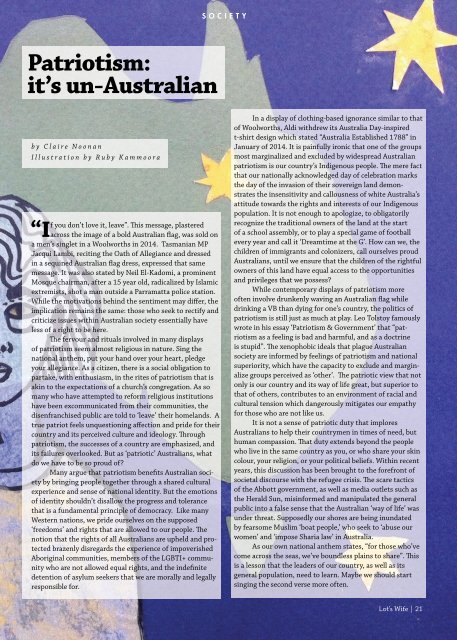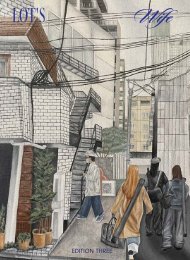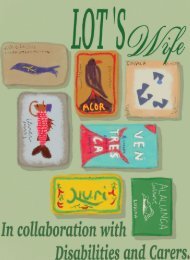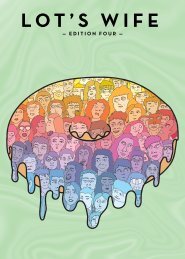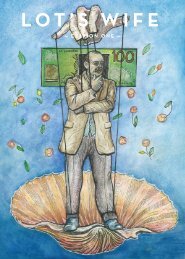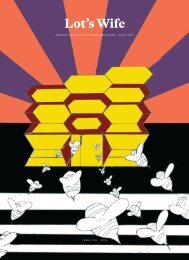Lot's Wife Edition 2 2016
You also want an ePaper? Increase the reach of your titles
YUMPU automatically turns print PDFs into web optimized ePapers that Google loves.
SOCIETY<br />
Patriotism:<br />
it’s un-Australian<br />
by Claire Noonan<br />
Illustration by Ruby Kammoora<br />
f you don’t love it, leave”. This message, plastered<br />
“Iacross the image of a bold Australian flag, was sold on<br />
a men’s singlet in a Woolworths in 2014. Tasmanian MP<br />
Jacqui Lambi, reciting the Oath of Allegiance and dressed<br />
in a sequined Australian flag dress, expressed that same<br />
message. It was also stated by Neil El-Kadomi, a prominent<br />
Mosque chairman, after a 15 year old, radicalized by Islamic<br />
extremists, shot a man outside a Parramatta police station.<br />
While the motivations behind the sentiment may differ, the<br />
implication remains the same: those who seek to rectify and<br />
criticize issues within Australian society essentially have<br />
less of a right to be here.<br />
Th e fervour and rituals involved in many displays<br />
of patriotism seem almost religious in nature. Sing the<br />
national anthem, put your hand over your heart, pledge<br />
your allegiance. As a citizen, there is a social obligation to<br />
partake, with enthusiasm, in the rites of patriotism that is<br />
akin to the expectations of a church’s congregation. As so<br />
many who have attempted to reform religious institutions<br />
have been excommunicated from their communities, the<br />
disenfranchised public are told to ‘leave’ their homelands. A<br />
true patriot feels unquestioning affection and pride for their<br />
country and its perceived culture and ideology. Through<br />
patriotism, the successes of a country are emphasized, and<br />
its failures overlooked. But as ‘patriotic’ Australians, what<br />
do we have to be so proud of?<br />
Many argue that patriotism benefits Australian society<br />
by bringing people together through a shared cultural<br />
experience and sense of national identity. But the emotions<br />
of identity shouldn’t disallow the progress and tolerance<br />
that is a fundamental principle of democracy. Like many<br />
Western nations, we pride ourselves on the supposed<br />
‘freedoms’ and rights that are allowed to our people. The<br />
notion that the rights of all Australians are upheld and protected<br />
brazenly disregards the experience of impoverished<br />
Aboriginal communities, members of the LGBTI+ community<br />
who are not allowed equal rights, and the indefinite<br />
detention of asylum seekers that we are morally and legally<br />
responsible for.<br />
In a display of clothing-based ignorance similar to that<br />
of Woolworths, Aldi withdrew its Australia Day-inspired<br />
t-shirt design which stated “Australia Established 1788” in<br />
January of 2014. It is painfully ironic that one of the groups<br />
most marginalized and excluded by widespread Australian<br />
patriotism is our country’s Indigenous people. The mere fact<br />
that our nationally acknowledged day of celebration marks<br />
the day of the invasion of their sovereign land demonstrates<br />
the insensitivity and callousness of white Australia’s<br />
attitude towards the rights and interests of our Indigenous<br />
population. It is not enough to apologize, to obligatorily<br />
recognize the traditional owners of the land at the start<br />
of a school assembly, or to play a special game of football<br />
every year and call it ‘Dreamtime at the G’. How can we, the<br />
children of immigrants and colonizers, call ourselves proud<br />
Australians, until we ensure that the children of the rightful<br />
owners of this land have equal access to the opportunities<br />
and privileges that we possess?<br />
While contemporary displays of patriotism more<br />
often involve drunkenly waving an Australian flag while<br />
drinking a VB than dying for one’s country, the politics of<br />
patriotism is still just as much at play. Leo Tolstoy famously<br />
wrote in his essay ‘Patriotism & Government’ that “patriotism<br />
as a feeling is bad and harmful, and as a doctrine<br />
is stupid”. The xenophobic ideals that plague Australian<br />
society are informed by feelings of patriotism and national<br />
superiority, which have the capacity to exclude and marginalize<br />
groups perceived as ‘other’. The patriotic view that not<br />
only is our country and its way of life great, but superior to<br />
that of others, contributes to an environment of racial and<br />
cultural tension which dangerously mitigates our empathy<br />
for those who are not like us.<br />
It is not a sense of patriotic duty that implores<br />
Australians to help their countrymen in times of need, but<br />
human compassion. That duty extends beyond the people<br />
who live in the same country as you, or who share your skin<br />
colour, your religion, or your political beliefs. Within recent<br />
years, this discussion has been brought to the forefront of<br />
societal discourse with the refugee crisis. The scare tactics<br />
of the Abbott government, as well as media outlets such as<br />
the Herald Sun, misinformed and manipulated the general<br />
public into a false sense that the Australian ‘way of life’ was<br />
under threat. Supposedly our shores are being inundated<br />
by fearsome Muslim ‘boat people,’ who seek to ‘abuse our<br />
women’ and ‘impose Sharia law’ in Australia.<br />
As our own national anthem states, “for those who’ve<br />
come across the seas, we’ve boundless plains to share”. This<br />
is a lesson that the leaders of our country, as well as its<br />
general population, need to learn. Maybe we should start<br />
singing the second verse more often.<br />
Lot’s <strong>Wife</strong> | 21


